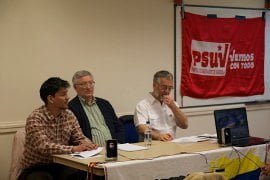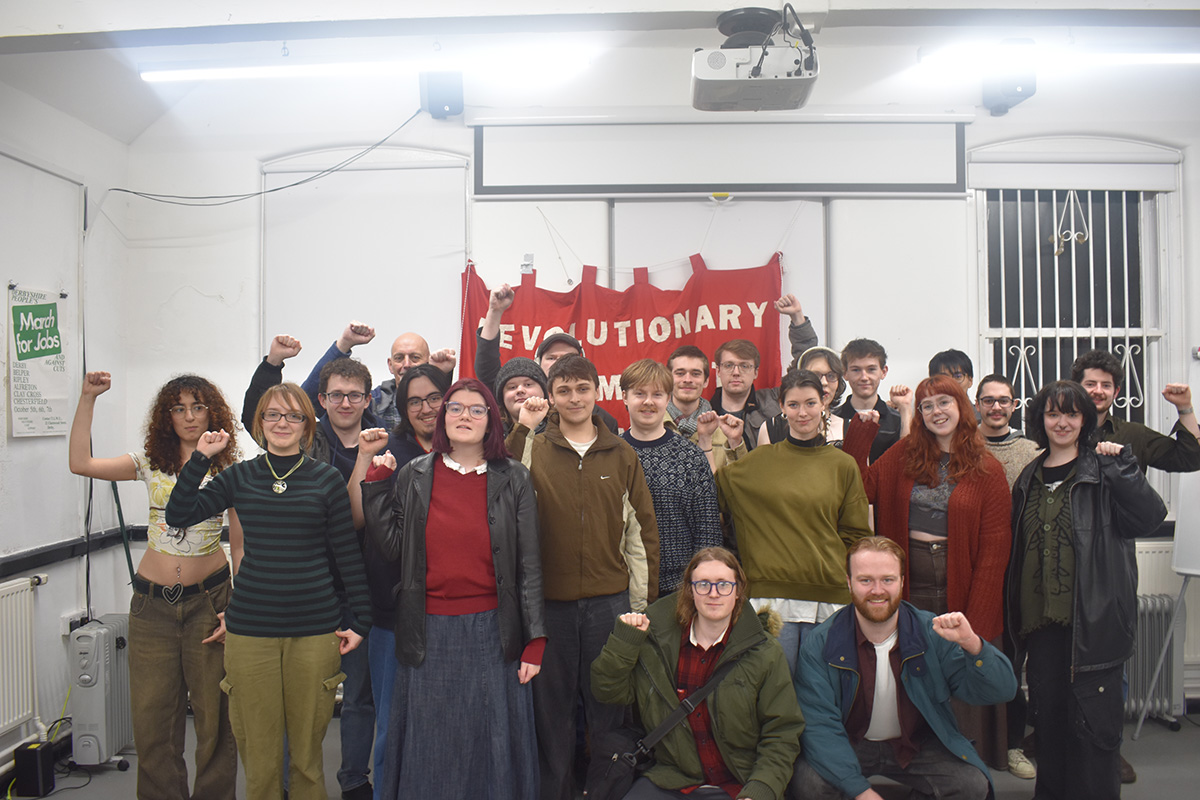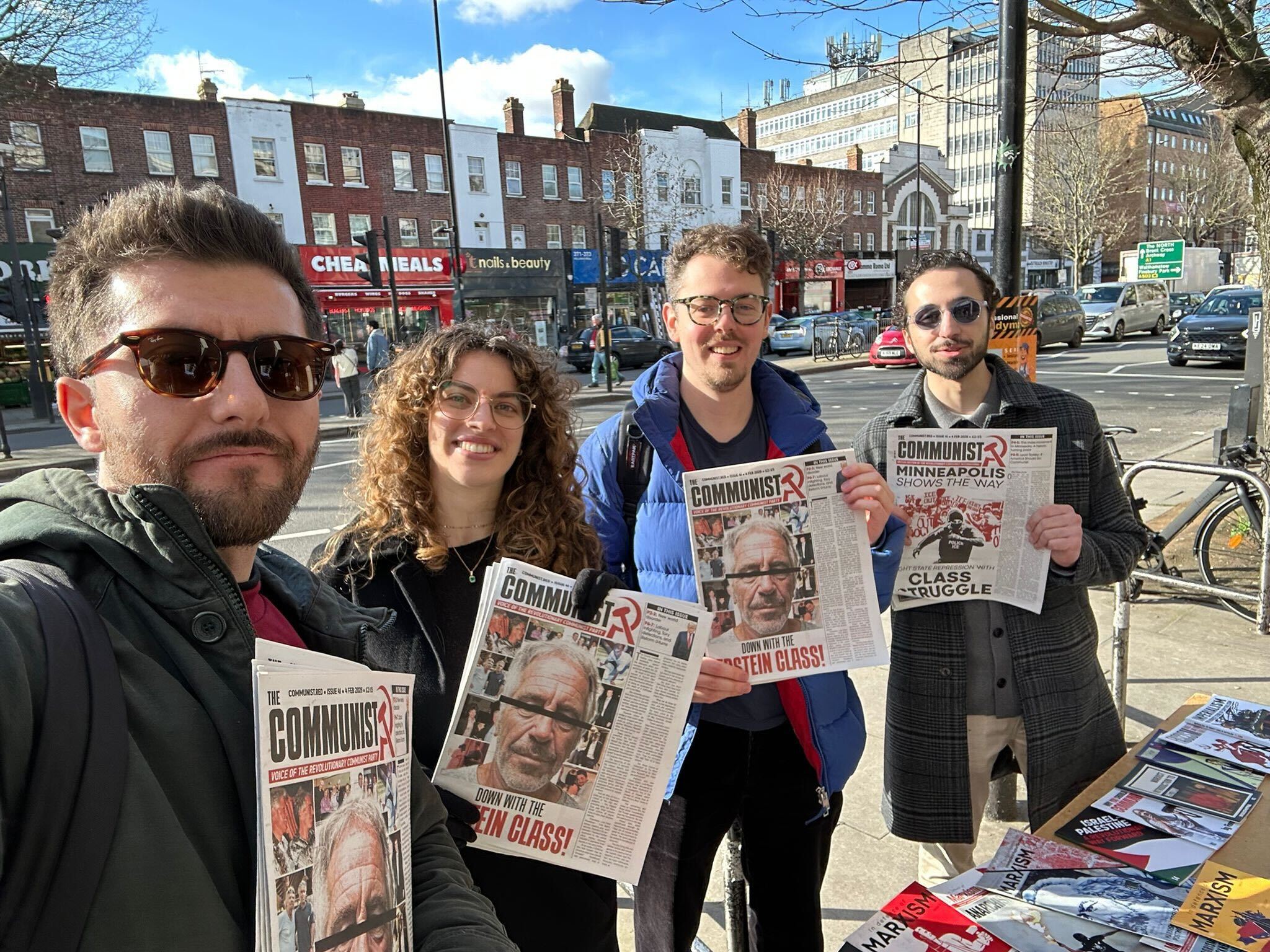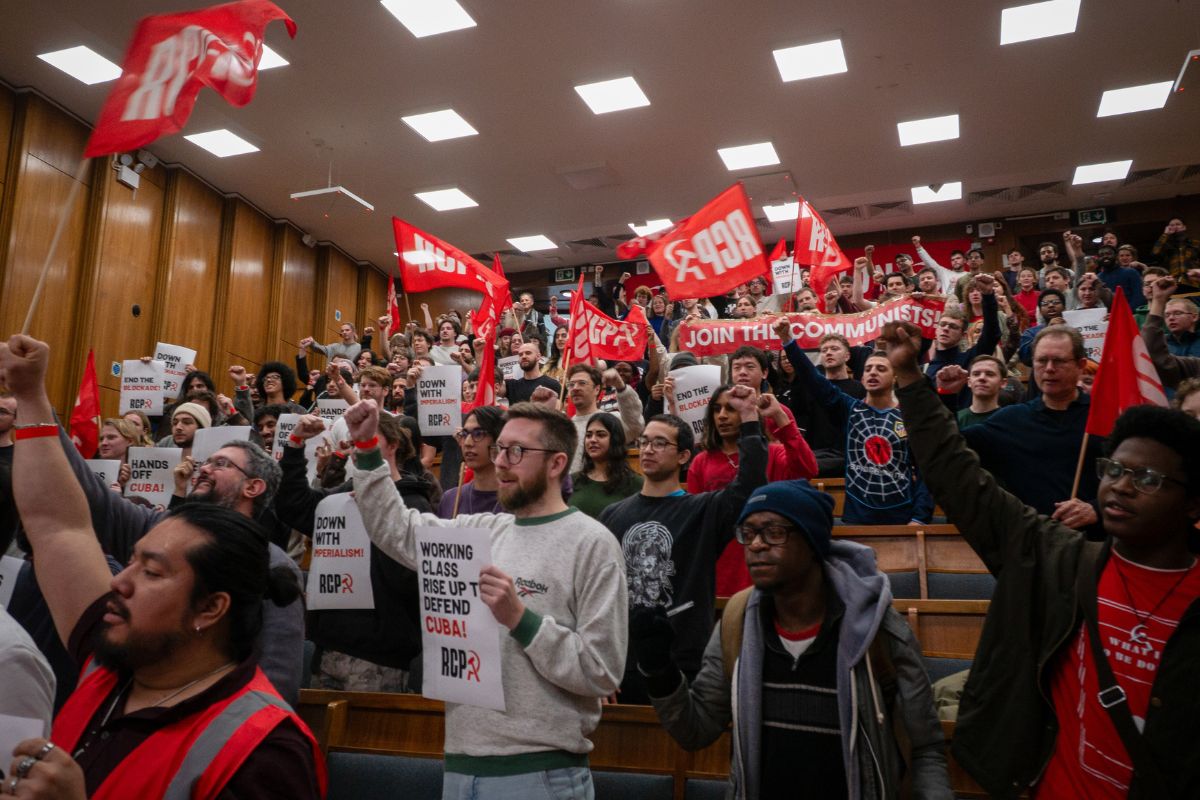Over 50 activists, trade unionists, youth and Latin American activists, met in London on 4th May to discuss about the legacy of Hugo Chávez and the challenges facing the Bolivarian revolution. The meeting reaffirmed our rejection of the opposition claims of electoral fraud and renewed our commitment to defend the democratically expressed will of the Venezuelan people to elect Nicolás Maduro as president.
Over 50 activists, trade unionists, youth and Latin American activists, met in London on 4th May to discuss about the legacy of Hugo Chávez and the challenges facing the Bolivarian revolution. The meeting reaffirmed our rejection of the opposition claims of electoral fraud and renewed our commitment to defend the democratically expressed will of the Venezuelan people to elect Nicolás Maduro as president.
The meeting was opened by Darrall Cozens who asked the audience to observe a minute’s silence in homage to Hugo Chávez.
The first speaker was Yaruma Rodriguez, cultural attaché to the embassy of the Bolivarian Republic of Venezuela in the UK, who brought greetings and apologies from Ambassador Samuel Moncada who is currently in Venezuela. He started by describing the benefits to workers in the newly approved Labour Law. Yaruma also explained in detail the functioning of the Venezuelan electoral system in order to refute opposition allegations of fraud. He explained how voters have to identify themselves, their ID cards are checked against a picture database and then their fingerprints also checked. Voting is electronic but then each voter receives a paper receipt in order to confirm the vote which is put in a box. After the closing of the polling stations, 56% of all polling booths are chosen at random for an audit, which involves checking the machine registered vote against the paper receipts. This audit is public and takes place in front of witnesses from both the Bolivarian and the opposition campaigns. Furthermore, the actual voting system underwent a whole series of audits which were witnessed by opposition and socialist technicians. (Full text of his speech can be found here)
We then screened a number of short clips of Hugo Chavez. This included part of his BBC Hard Talk interview, when he stated that “there can be no democracy under capitalism, only in socialism can there be genuine democracy”; his statement at the Copenhagen climate summit that “socialism is the only way to save the world and you can only do it through revolution”; his rebuttal of “the stupid people of Fox News”, as well as his defence of socialism and thanks to the Hands Off Venezuela campaign during his visit to London.
This was followed by Alan Woods, founder of the Hands Off Venezuela campaign and a friend of Hugo Chávez, who spoke at length about the legacy of the late Venezuelan president and revolutionary leader. Mixing personal anecdotes with political analysis Alan described the crucial role which Chávez had played in the Bolivarian revolution. “There was a chemical reaction between the revolutionary masses and the president”, he said, “the fed on each other.” Alan described Chávez as a “corageous revolutionary leader” who stood “head and shoulders above most of the leaders of the Left in Europe.”
Coming from a military background, “he joined the Army so he would be able to play baseball”, he dared to challenge the power of the oligarchy and of imperialism.
Alan Woods explained some of the main achievements of the revolution, in the fields of health care, education, housing, etc. but also underlined that this was not even the main reason for the mass support for Chavez, which had to be found in a different factor: “Chavez gave voice to the poor, the working people, the dispossed, those who had never had a voice before”, said Alan explaining that this was the reason why millions turned out at his funeral.
Alan also stressed the role Chavez had played in bringing back the debate about socialism, describing how this was received with enthusiasm by the workers and peasants gathered at the Teresa Carreño Theatre, but with horror by many bureaucrats and careerists in the Bolivarian movement. The Bolivarian revolution can only be completed by expropriating the oligarchy, Alan underlined.
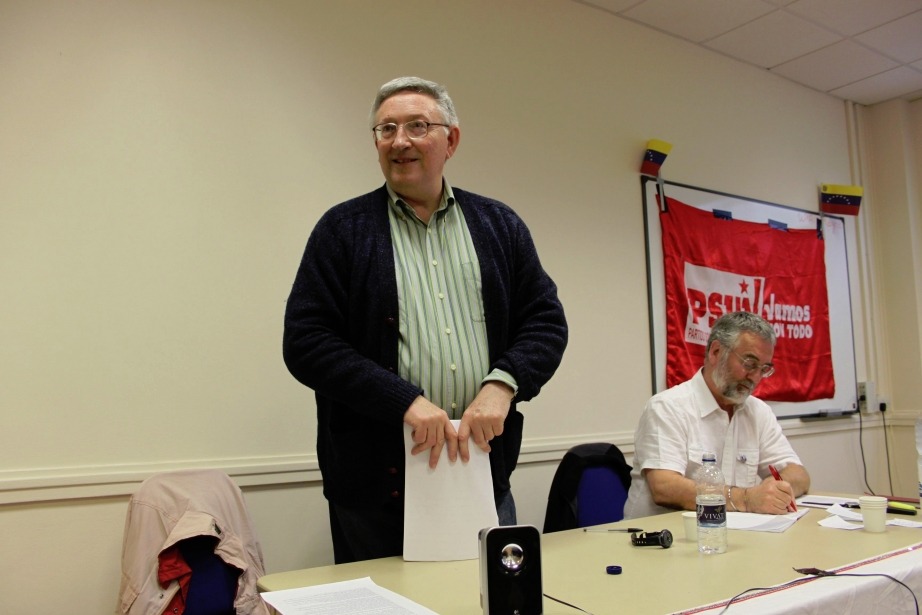 Describing an incident in which he had been invited to ride in the presidential car during the summit of non-aligned countries in Margarita Island, Alan explained how Chávez pointed at the waving crowds of Bolivarian supporters and said: “These are the people who must take control of this Revolution.” The fate of the revolution, which has not yet been completed, lies in the revolutionary masses, concluded Alan. This was followed by a lively discussion. Amongst those speaking was Alberto Durango, one of the leading activists of the campaign to organise cleaners in London, the majority of whom are Latin American immigrants, many of them without legal papers. In his reply Alan stressed something which Chávez always repeated: “the best way to defend the Venezuelan revolution is to fight for socialism in Britain!”
Describing an incident in which he had been invited to ride in the presidential car during the summit of non-aligned countries in Margarita Island, Alan explained how Chávez pointed at the waving crowds of Bolivarian supporters and said: “These are the people who must take control of this Revolution.” The fate of the revolution, which has not yet been completed, lies in the revolutionary masses, concluded Alan. This was followed by a lively discussion. Amongst those speaking was Alberto Durango, one of the leading activists of the campaign to organise cleaners in London, the majority of whom are Latin American immigrants, many of them without legal papers. In his reply Alan stressed something which Chávez always repeated: “the best way to defend the Venezuelan revolution is to fight for socialism in Britain!”
The afternoon session was centered on the report by Yenny Cortez, from the Gotcha occupied textile factory in Aragua, Venezuela, our guest speaker. She explained in detail the struggle of the women workers of Gotcha, starting from their immediate demands for full rights and benefits against the employer, their attempt to organise a union, and how this led them to occupy the premises and eventually to re-start production under workers’ control.
She explained how their struggle was part of a wider movement of occupied factories and the movement for workers’ control. “We have had to struggle not only against the old owners and for nationalization under workers’ control, but also against bureaucrats within the state institutions who are sabotaging workers’ control,” she said. The way forward is to create a “workers’ state, one which is controlled by the workers and peasants, to show the bureaucracy that we are fully prepared to take over the running of society and brush them aside.”
This was a moving speech which showed the transformation of ordinary working people in the process of the Venezuelan revolution. (You can watch her whole speech in this VIDEO in Spanish and English:
The next speaker was Jorge Martín who explained in detail the attempted coup carried out by the opposition after the April 14 elections. “The mass media have talked of ‘post-election violence’, but never mentioned that the 9 people killed were all Bolivarian, socialist supporters,” he said. He also went on to discuss why the election result had been so narrow. “In effect, between 600 and 700,000 people who voted for Chávez on October 7, 2012, then voted for the opposition candidate on April 14,” Jorge said, “and this is the result of the fact that the revolution has not been completed and the capitalists are continuing to sabotage the economy”.
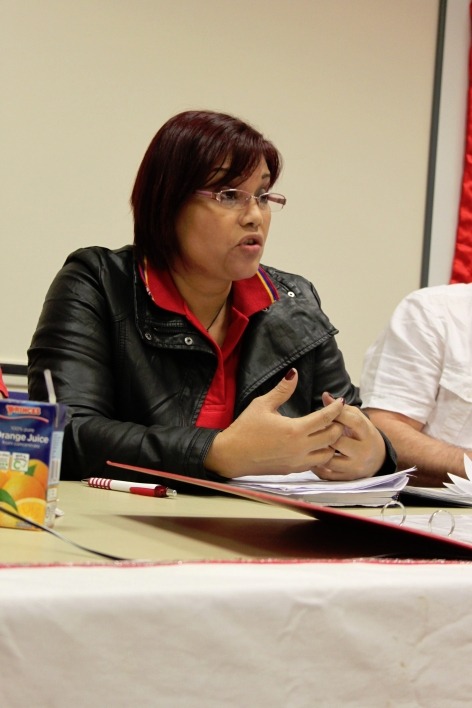 Jorge said that in his opinion there were three main challenges facing the Bolivarian revolution in the next period. One, that of the economy, which continued to be capitalist but was hampered by many regulations introduced by the government to alleviate the impact of capitalism on working people. “You cannot regulate the free market, if you attempt to do so you end up with sabotage, investment strike, flight of capital, hoarding and speculation,” he argued, “the solution is the expropriation of the means of production under workers’ control.” “In fact,” he explained, “it would be sufficient to expropriate the properties of those who signed the Carmona decree of the April 2002 coup, that would put an end to capitalism in Venezuela.” Second was the question of the state apparatus, which was still largely the old capitalist state. “This needs to be destroyed and replaced by new revolutionary institutions based on the workers’ councils and the communes, as it is stated in the election program Chávez stood on in October”. Finally there was the question of revolutionary organization and leadership, which was constantly suffocated by the bureaucracy within the Bolivarian movement.
Jorge said that in his opinion there were three main challenges facing the Bolivarian revolution in the next period. One, that of the economy, which continued to be capitalist but was hampered by many regulations introduced by the government to alleviate the impact of capitalism on working people. “You cannot regulate the free market, if you attempt to do so you end up with sabotage, investment strike, flight of capital, hoarding and speculation,” he argued, “the solution is the expropriation of the means of production under workers’ control.” “In fact,” he explained, “it would be sufficient to expropriate the properties of those who signed the Carmona decree of the April 2002 coup, that would put an end to capitalism in Venezuela.” Second was the question of the state apparatus, which was still largely the old capitalist state. “This needs to be destroyed and replaced by new revolutionary institutions based on the workers’ councils and the communes, as it is stated in the election program Chávez stood on in October”. Finally there was the question of revolutionary organization and leadership, which was constantly suffocated by the bureaucracy within the Bolivarian movement.
A lively debate followed, which also dealt with the question of what can we do here in Britain to defend the Bolivarian revolution. There was a strong feeling that our campaign is not just about abstract solidarity with a far away country, but above all an activist movement fighting for revolutionary change in Britain as well. In this respect the policy of HOV of getting involved in the struggle against austerity cuts, the struggle of the cleaners for a living wage and linking up with other Latin American campaigns and groups in Britain was reaffirmed.
The resolutions were voted and amended, the financial report was approved and a new steering committee elected in the best democratic traditions of the revolutionary movement (see here for the full text of those).
Source: London Hands Off Venezuela Conference – Defend the Bolivarian revolution, respect democracy!
Report by Jason Phillips:
Saturday 4th May saw the first Hands Off Venezuela conference held in London since the death of Hugo Chavez and the election of Nicolás Maduro as President of Venezuela.
We were told beforehand that opposition supporters based in London could possibly turn up at the meeting to vent their frustration at losing the recent election. An election where the electoral system itself has been called by international observers, including by former US presidents Jimmy Carter, “the best in the world”. In the end the opposition decided not to come and the atmosphere was instead positive.
We first listened to a special guest from the London Venezuelan embassy, cultural attaché Yaruma Rodriguez. He spoke about the social progress that has been achieved under the presidency of Chavez and will continue to be achieved under Maduro. Yaruma also spoke about the recent violence on the streets of Venezuela by opposition supporters that has led to the deaths of a number of Maduro supporters. He also spoke about the advanced technology behind the electoral system used in Venezuelan elections that has been put in place to make sure these systems cannot be used incorrectly intentionally or not. Technology that is also there to make sure auditing of the ballot boxes after an election can be carried out correctly. He said that observers from around the world, including from Britain, had commented on the efficiency and transparency of the election, and that the decision by the opposition, led by Henrique Capriles who has contested the validity of the election results, not to take part in an audit of the results “…shows that Capriles’ claims are baseless and a cynical attempt to sabotage a democratically elected government and disregard the will of the Venezuelan people”.
Alan Woods, one of the founders of Hands Off Venezuela, then spoke about his personal relationship with Hugo Chavez and the legacy of the man. Alan said that more than the social improvements Chavez implemented, which were vast, Chavez gave a voice to the ordinary person and created a movement to challenge the idea that capitalism is the best economic system we can have. Alan also commented on the important difficulties in the economy in Venezuela currently that has led to the closeness of the result in the election. Alan argued that the only way forward for Venezuela to improve its economy is to completely overhaul the economic system on socialist grounds i.e. to complete the tasks Chavez unfortunately could not complete. You can have a capitalist market economy, which benefits capitalists, or you can have a socialist planned economy, he explained, there is no way the two can be mixed, that leads to inflation, sabotage, scarcity, speculation and flight of capital.
Jorge Martin, International Secretary of the Hands Off Venezuela campaign, then commented more on his legacy by giving us details of the achievements made during his presidency. For example, he mentioned illiteracy has been eliminated. 1.8 million people have been taught the basics of how to read and write for the first time in their lives. There has also been a massive expansion of access to higher education. The amount of higher education students has gone up from 800,000 in 1998 to 2.1 million now, and access is free of charge. The number of people receiving a pension has gone up from 500,000 in 1998 to 2 million now. The level of poverty has gone down from a peak in 2002/03 at 60% to 31%. The level of extreme poverty has decreased from a peak of 30% to 8% and continues to go down. Cataract operations for hundreds of thousands of people, not only in Venezuela but also in other parts of Latin America, have given sight back to people who didn’t think they would see again. Also, a housing program was started in 2010 because of people losing their houses due to flooding. This program was created to build better housing not only for those who lost their houses but also to ordinary people whose houses were inadequate due to things like overcrowding. 375,000 fully furnished houses have been built for these people in 2 years and given to families free of charge.
So, even though capitalism still exists in this country the reason these things could have been achieved was because money was directed away from the normal places money would have been directed to under a normal profit centred system. However, the main reason given by supporters, when asked why there was such support for Chavez was not because of these social benefits but because, as Alan and Jorge say, he gave the poor a voice. The supporters say Chavez gave them for the first time a sense of dignity. For the first time these people, who weren’t part of the political process before because of their class, had seen how the government was on their side for once. This is what a revolution is, when working people, usually excluded from politics, take their future into their own hands through direct action.
Rob Sewell, leading member of Socialist Appeal, then gave an account of what happened when Chavez came to Britain in 2006 where he publicly thanked the Hands Off Venezuela campaign for its support.
Our second special guest was a leading activist of a textile factory in Venezuela, Yenny Cortez. Workers now run this factory under workers’ control and management, and she gave an account of this on-going experience. She said that they learned through experience that they were not only fighting for individual workers’ rights but that they were fighting to take over the running of the entire factory. This was because the boss of the factory was going to close down the factory to stop a union from being established, and this was not an isolated case where bosses were ready to shut down factories on this basis. She also said, even though this factory hasn’t been expropriated by the state, the struggle continues and it has now been in the hands of the workers for 5 years. Yenny then emphasized the importance of building links with the local community surrounding the factory, a factory that is now in cooperation in helping the community’s own struggles. She then went on to say this isn’t the only factory to have been taken over by the workers. There are many others that have been taken over and there is unity between these different workplaces.
Through the experience of starting up the production lines in this factory by themselves, Yenny says the workers are now fully aware of the entire process of producing the factory’s output from start to finish. She also mentioned that the workers carry out democratic processes to elect the management of the factory. But the biggest obstacles in the way, according to Yenny, to enable the smooth running of the factory come mainly from the bureaucrats in the civil service and the capitalist class who make it hard, for example, to obtain the raw materials needed to produce things.
At the end of Yenny’s talk the Chairman summed it up by saying that these kinds of problems where a company hasn’t been nationalised and therefore has these kinds of problems from certain sections, is something we have to learn from through experience, and in the past in Britain there have been experiences of this happening here as well.
We then had contributions from the audience who spoke about the role of Hands Off Venezuela in the future, and there were also contributions about workers management. Jorge Martin then gave the last talk, which was on the future of the campaign, which included voting on new resolutions for Hands Off Venezuela and the election of the Hands Off Venezuela steering committee.
Alan Woods summed up the situation with the revolution going forward and Hands Off Venezuela when he said, “we stand for the full defence of the Venezuelan revolution, but also as friends we have a responsibility to give advice to complete the revolution forward towards socialism.” He finally, by quoting from Chávez himself, he said that the best way to help the Bolivarian revolution “is to carry out a revolutionary transformation here!”

